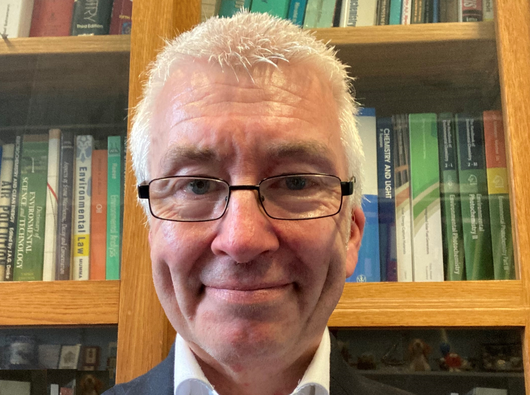Brain fog
Brain fog can often be a side effect of blood cancer or its treatment. It can affect your concentration, memory and thinking processes.
What is brain fog?
Brain fog describes the mental cloudiness that can happen when your cognition is impacted. Cognition refers to the brain's ability to communicate, think, remember, and work things out. Many people who have changes to their cognitive ability find they can still do most everyday things, but it may take them longer or feel more difficult than before.
Brain fog is usually temporary and often goes away once treatment for blood cancer has finished. The symptoms of brain fog can be frustrating and may interfere with your normal activities, but in time, people with blood cancer often find their mental sharpness recovers.
Brain fog can start at any time, including after treatment, and can affect people of all ages. Some people try to push through their symptoms and find it hard to be open about what they are experiencing. Brain fog is an invisible symptom, which can make it harder for other people to identify. It’s important that you tell your hospital team about any changes you’re experiencing, so you can get the support and advice you need. Sharing what you’re going through with others gives them the opportunity to help you too.
Symptoms of brain fog
Symptoms can include:
- difficulty concentrating on tasks
- trouble having long conversations
- trouble remembering things
- difficulty doing more than one thing at the same time
- slower thinking and processing of information
- taking longer to do things
- fatigue issues
- being more disorganised than usual.
Brain fog can range in severity and for some people it may only cause very subtle changes to their thinking that other people may not even notice. In other cases, it can change the ability to do everyday tasks. Brain fog often lasts after treatment finishes but will usually get better after a few months. In some cases, it can last much longer and can also continue for those on long-term treatment.
What does brain fog feel like?
Brain fog can be a difficult symptom to explain to other people. We spoke to people with blood cancer about what if feels like for them.
‘It’s like wading through treacle in your mind, everything takes more effort to process.’
‘I forget things like peoples’ names, even if I’ve known them for ages, and I often can’t find the right words for what I’m trying to say.’
‘It takes me double the effort to do a task because my brain feels so foggy, and I can’t concentrate on things. People don’t realise how hard it is for me to do the same things as before.’
‘It’s like a heaviness, a cloudiness that makes my brain work slower than before. I get mixed up sometimes and make mistakes that I didn’t used to make.’
‘It feels like a fatigue of the mind, my brain feels so tired and like it needs a rest.
What causes brain fog?
The causes of brain fog are unclear, but research suggests it is caused by a combination of factors. Brain fog can be caused by treatments for blood cancer such as chemotherapy, targeted therapies, or steroids. In some cases, symptoms like fatigue, chronic pain or sleep issues can also contribute to causing brain fog. There can also be other causes that aren’t always related to blood cancer. These include older age, infections, hormone changes, nutritional deficiencies, alcohol, and emotional concerns such as depression or anxiety.
Being diagnosed with blood cancer and having treatment can be a stressful and emotional time. Many people find that stress can make their brain fog worse. Not knowing what the cause of brain fog is, or how best to control and ‘fix’ it can be challenging. It’s normal to feel angry or upset that your brain isn’t working in the way that it used to and want to change that. There are lots of things that can help brain fog. Even if it’s caused by your treatment or cancer, there are actions you can take to minimise its impact on your life.
Managing and treating brain fog
Many treatments for brain fog involve lifestyle changes and day-to-day management of the symptoms. Brain fog affects people differently, so what helps can also be different for each person. There are lots of things you can try, until find the combination that works for you. Here are the things that other people have found helpful:
Things that could reduce brain fog
- Exercise: you may not feel like exercising if you have blood cancer. But if you are up to it, even short walks can help brain fog and the mental fatigue that comes with it. Being out in nature can be stimulating for the brain and exercising has been shown to improve cognitive function. We have some exercise videos you can try.
- Meditation: this just means stopping and focussing on the moment you are in. You don't need any special skills, and we have some guided videos you can try. Meditation calms the mind and lowers stress levels. It improves focus and concentration and is good for overall brain health.
- Sleep and rest: fatigue and brain fog are very much connected. Getting good quality sleep and maintaining good sleep hygiene can be helpful. Taking small rest breaks throughout the day can help prevent dips in your energy and cognitive functioning. It's better to build rest breaks into your routine so that you use rest as a preventative measure, rather than waiting until the fatigue and brain fog gets bad before you stop and rest.
- Reducing stress: stress is known to make brain fog and fatigue worse. Having treatment for blood cancer can be an emotionally challenging time and it’s normal to feel stressed. Accepting that brain fog is usually a temporary side effect of treatment and showing compassion and patience to yourself as you go through this can be helpful in finding it easier to live with brain fog. We have more tips for managing stress and the emotional impact of blood cancer.
- Mental exercises: it’s important to rest if you have bad periods of brain fog, but also challenging your brain to work in different ways or to learn new things can help brain fog in the long-term. Doing brain exercises, starting a new hobby, or learning a new skill is good for your brain and gradually increasing these activities can help you tolerate higher levels of cognition.
- Keep doing things that make you happy: doing things that we enjoy relaxes our brain and helps us feel energised, all things that can help ease the impact of brain fog.
Food and drink tips
- Eat a healthy diet: nutritional deficiencies can make brain fog worse so eating a balanced diet full of vegetables, especially the leafy greens, can help prevent this.
- Drink water: even mild dehydration can affect your cognitive function. All the cells in your body, including your brain, need water to work efficiently. Make sure you drink the recommended 6 to 8 cups of fluid a day.
- Avoid alcohol: alcohol and the fact that it dehydrates your body makes brain fog worse.
Adapting your lifestyle
- Organisational tools: make life as easy as possible for yourself by using a planner, diary, or an app to keep everything you need to remember in one place. You can also use this to track tasks you need to do and appointments and treatments that you have.
- Pacing: you may find your brain fog fluctuates throughout the day and is better or worse when doing certain tasks. Do the most difficult tasks at the time of day when you have the most energy. Take breaks in between tasks or break large tasks up into smaller tasks. Managing brain fog is a marathon not a sprint and learning to pace yourself can take time. Listen to your body and work out when it needs to rest and when it is ready for activity. Different activities require different cognitive skills so it can be helpful to switch between different tasks to maximise what function and energy you do have.
- Get into a routine: this will help because it removes lots of seemingly small decisions that really add up and take energy every day. Having a regular routine means you know what you will do and when, without having to do too much thinking and planning each day or week.
- Adapt tasks: it may be that there are some tasks you’re not able to do right now. However, sometimes tasks can be made more manageable by doing them a different way. For example, sending voice notes instead of typing, or getting ready prepared meal boxes instead of cooking from scratch.
- Ask for help when you need it: family and friends can help with tasks you’re struggling with to help you save energy.
- Be kind to yourself: brain fog may mean you don’t have the same sharpness of mind as before. It’s okay if you are grieving for that and are struggling to accept the way your brain is currently working. It’s normal to feel frustrated and it’s okay to allow yourself to feel down sometimes.
"I get days of brain fog and times when the fatigue is like wading through treacle. But even with cancer, you can be an asset to your organisation."
Peter, diagnosed with MDS.
Read Peter's story about continuing to work with side effects.

Impact on your day to day life
Having brain fog may impact your ability to do everyday activities like work, cooking, socialising, or studying. Our ability to do tasks and activities can make up our sense of who we are. When this changes, it can change our identity and the way that we feel about ourselves.
In some cases, brain fog may impact your ability to work. There is help and support with employment if you need it.
Brain fog and fatigue often go hand in hand, so improving your fatigue can be helpful with managing brain fog.
Brain fog can be a complicated symptom to understand and it’s normal to feel like others around you don’t ‘get’ it. You can speak to others with brain fog on our online forum or you can speak to us directly.
It's also normal for these symptoms to impact your emotional well-being. It’s important you seek support if you need it. Your hospital team can help you find someone to talk to, or you might find our information on mental well-being helpful.

How to manage fatigue
For lots of practical ways to boost your energy, manage extreme tiredness, and to read other people's stories, visit our page all about fatigue.
